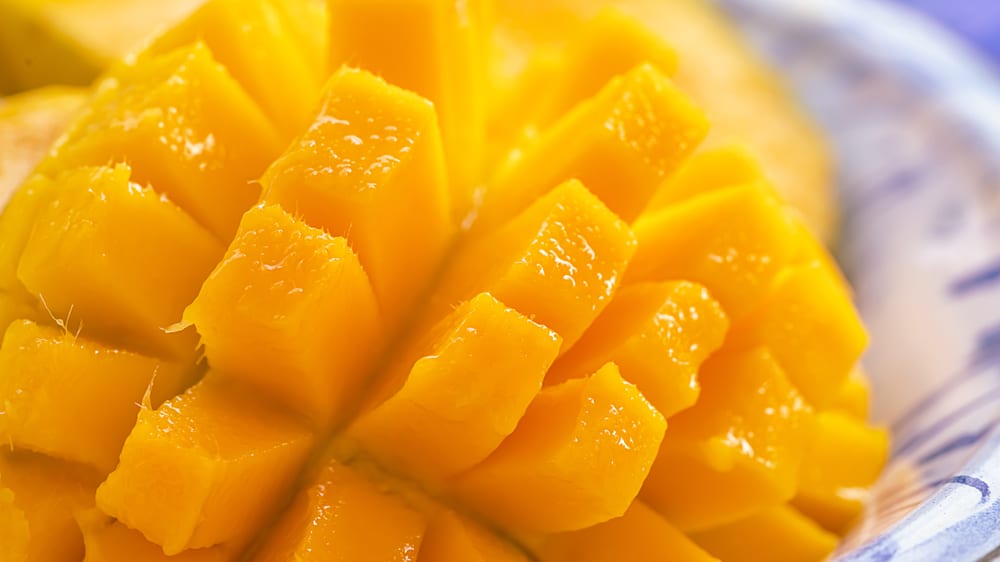Slippery Mango, Tart Tangerine: Compassion for Gastrointestinal Disabilities
CONTENT NOTE: brief mention of unintentional weight loss
.
.
.
.
.
.
.
.
.
.
.
.
.
.
.
.
.
.
You are at a holiday party and the crowd is tossing back eggnog and devouring mini sandwiches full of hot peppers and cheese. You are at dinner with friends and you’re having tapas, so everyone expects you to share with the table. You are at a theater to see a delightful new movie and your date asks you to share a giant bucket of popcorn. You are with a group of friends who are devouring tomatoes straight from one of their gardens, sloshing them through their mouths, moaning over how delicious they are as you watch in stunned silence.
These are just a few examples of what can happen to those of us who live with gastrointestinal issues when we’re placed in social settings that involve food. And, let’s be real, that’s nearly every social setting in the U.S., from office meetings to school outings and concerts. It’s amazing how isolating and disheartening it can be to be unable to eat the foods you most love and enjoy. But if you add being unable to eat and share in these foods with your friends, lovers, or family, it’s particularly brutal. In this country, as in most, food is frequently used for celebration. It hurts to not be able to fully engage in celebration—of a wedding, a child’s birthday, your parents’ fiftieth anniversary.
Whether you have something commonplace like ulcers, IBS, or lactose intolerance, something rarer like Crohn’s disease, or something wildly rare like mesenteric panniculitis (the disease I live with): it just doesn’t feel good to be unable to toast with everyone else.
As I write this, my diet consists primarily of very mild macaroni and cheese and banana-peanut butter protein smoothies. This isn’t because these are my favorite foods—though it’s amazing what you can adjust to, and how quickly—but because they’re two of the only foods that do not cause my lower abdomen to churn in waves of sharp, thresher-like pain. I was also losing weight quickly; the protein smoothies not only have multiple sources of protein, but also contain nearly 700 calories each. Eating one daily has kept me from losing more than thirty pounds or so.
I eat these foods because I must, to survive. I rarely eat for pleasure any more, though I do try on occasion. In fact, just tonight, with my abdominal pain a bit better than usual for the past week, I decided to try some of my favorite Baltimore vegan food for the first time in almost a year. I desperately wanted delicious flavors squirming through my mouth, coming alive, reminding me of what I’ve been missing and what I’ll (eventually, maybe) be able to eat again.
I wasn’t foolish about it, by any means. I thought I’d crossed my tummy t’s and dotted my intestinal i’s! I ordered a vegan cheesesteak, but I had them remove both the hot peppers and the pickled vegetables. I also got risotto balls, but with vegan ranch instead of marinara. Finally, I got this amazingly delicious dessert that is basically fried balls of (really good) pizza dough covered in powdered sugar and rainbow sprinkles.
I knew this was a rich, dense meal. I knew I’d end up giving most of the fried dough to my best friend. (I really only wanted a few bites of this delectable, sprinkled treat.) But I had no idea how badly it would go, and how quickly. Most people who live with gastrointestinal issues can’t always know or safely predict flare ups. That’s why we so often err on the side of caution, eating burgers with no toppings or salads with no dressing. And it certainly doesn’t feel great when able-bodied people treat us as if we’re being difficult or somehow dishonest when we do this. We already feel sad and frustrated enough about not being able to eat food for enjoyment (or not as much as we used to). We don’t need to be guilt-tripped as well.
So please: if you know or meet people with gastrointestinal issues, show them a wealth of kindness. Do not insinuate that they are being difficult or “picky.” Do not push them to eat foods or drink liquids which they’ve made clear will make them sick. Trust me when I tell you that we already feel isolated enough, and sometimes even ashamed to boot. We live with this condition (or conditions) around the clock. We get hungry, think about what we’d love to eat, but, depending on who we are and what our condition is, there’s a great deal that just can’t be safely consumed. I, for one, can only eat about 5-10% of foods available to me at this point in time.
In my case, close to 90% of the food I ate before developing mesenteric panniculitis was spicy (Indian, Thai, Korean); the other 10% was generally acidic (citrus fruit, salads with vinegar). I can eat none of that now, unless I want to be bent over by so much pain that I consider going to the emergency room. Of course, I don’t generally go, just as so many of us don’t generally go to the hospital. We’ve learned the hard way that there is often nothing they can do for us, and they will gladly charge thousands of dollars to do this nothing.
Food is one of the quickest routes to pleasure that humans are capable of—faster than sex, massage, or snuggling with an infant. In eating, pleasure is instantaneous. You put a piece of brie on your tongue, and the flavor spreads, dense and rich, immediately throughout your mouth. You eat a smoked almond, and the second you crunch into it, tangy flavor swirls around your taste buds. You eat a tomato fresh from the garden, and the sweet acidic squish delights you—again, immediately.
Many of us with gastrointestinal disorders cannot make the decision to relieve the stress of a grueling day by eating pizza or drinking beer. (Though, of course, the specific problem foods vary from one person and one disease to another.) If we’ve just been dumped, many of us can’t gorge ourselves on red pepper-flaked chicken, quickly soothed as the spices engulf our tongues. Many more of us can’t safely drown our sorrows in a delicious pint of ice cream.
More likely, we would make ourselves sick and even more miserable, just as I made myself sick tonight. I had just three bites of vegan cheesesteak and two small risotto balls, and very quickly felt pain rearing up in the quivering cave of my stomach. I didn’t even try the rainbow-drenched dough balls. And even though I’ve taken potent pain medicine since this happened, it’s not working.
I ate what I wanted to eat for just a few bites, and it was foolish of me. I suppose this is the price I pay. I’m not often foolish like this, because this terrible price is just not worth it. But sometimes I think, “Maybe I’m better.” I think, “Maybe it’s over. Why not try a bite of slippery mango, of tart tangerine?” This has never been a good idea. My doctors will inform me if I’m ever able to eat those things again and, other than my own body, they are the only people I should be listening to regarding my conditions.
It’s not just that it makes people with dietary limitations feel sad or outcast when we’re treated rudely or left out. There is a lot more that we miss out on as well—especially if we give in and eat something we shouldn’t after a guilt trip from a host. Let’s say you’re a writer and you’re excited to network with publishers and agents at a dinner party. You can’t very well do this if you’re bent over a toilet, retching or in a corner moaning in pain or discomfort. If we eat the wrong foods, we could be sick for days or even hospitalized. Some of us could even require surgery. This can result in missing out on essential income, lacking the ability to care for family members, missing a niece’s school play, or being unable to help our own child with a book report. It can result in being unable to do necessary schoolwork, potentially sending you down a slippery slope as you fall behind the rest of your class.
The resultant stress surrounding gastrointestinal disabilities can also have a massively deleterious effect on our mental health, whether it’s depression over what’s been lost, or anxiety over what may be lost in the days to come. Dietary restrictions are serious business, as is ignoring them. They should be taken as seriously as the need for insulin or antidepressants.
My plea is for you to be kind, generous, and understanding when you encounter someone with any sort of gastrointestinal disease. My plea is for you to never imply that we can eat foods which we’ve assured you we can’t. These are our bodies; trust them and trust us. My plea is for you to be more like my best friend, who not only believed me when I said most foods now make me sick, but tried to make my favorite Indian dish without tomatoes six or seven times, before giving up. My plea is for you to be more like my mother, who gave me glass jars full of homemade granola with only ingredients we knew I could eat, so that I might have a hearty and delicious breakfast every morning. (It also always reminds me of her, and of her enormous love; this is no small thing.)
No, you don’t have to cook for your sick friends to be a good person or friend. Certainly not! It was not so much the cooking, as the validation and support, that meant so much to me when my mom and best friend made food for me. It was them believing me, and visibly doing something to help me. Above all? Help your friend or family member by meeting them where they are. Don’t push spicy foods, sugar, or alcohol on your loved ones. (It’s a good rule of thumb to never push alcohol on anyone.) Don’t push any foods or drinks on them at all, even if you’re really sad they can’t try a favorite pie you made or a cupcake you thought they’d love.
It is difficult enough to have food ripped away from you as comfort, celebration, and sustenance. Please don’t make it harder for the people you encounter in life, known and unknown. Instead, please do the very simplest thing: believe them. And eat with them, even if they can only have plain toast. Drink with them, even if they have to toast with soy milk. Plain toast and plain soy milk can taste like the angels’ ambrosia when it’s eaten with the right company. Always remember this, too. We just want to be included. We just want to not be made to feel strange or dishonest or rude simply because we’re sick. Many foods won’t let people with gastrointestinal disabilities through their delicious doors any more—but you can certainly open your arms to these people yourself, wrap them close, and show them you believe their pain.
About Rooted In Rights
Rooted in Rights exists to amplify the perspectives of the disability community. Blog posts and storyteller videos that we publish and content we re-share on social media do not necessarily reflect the opinions or values of Rooted in Rights nor indicate an endorsement of a program or service by Rooted in Rights. We respect and aim to reflect the diversity of opinions and experiences of the disability community. Rooted in Rights seeks to highlight discussions, not direct them. Learn more about Rooted In Rights



